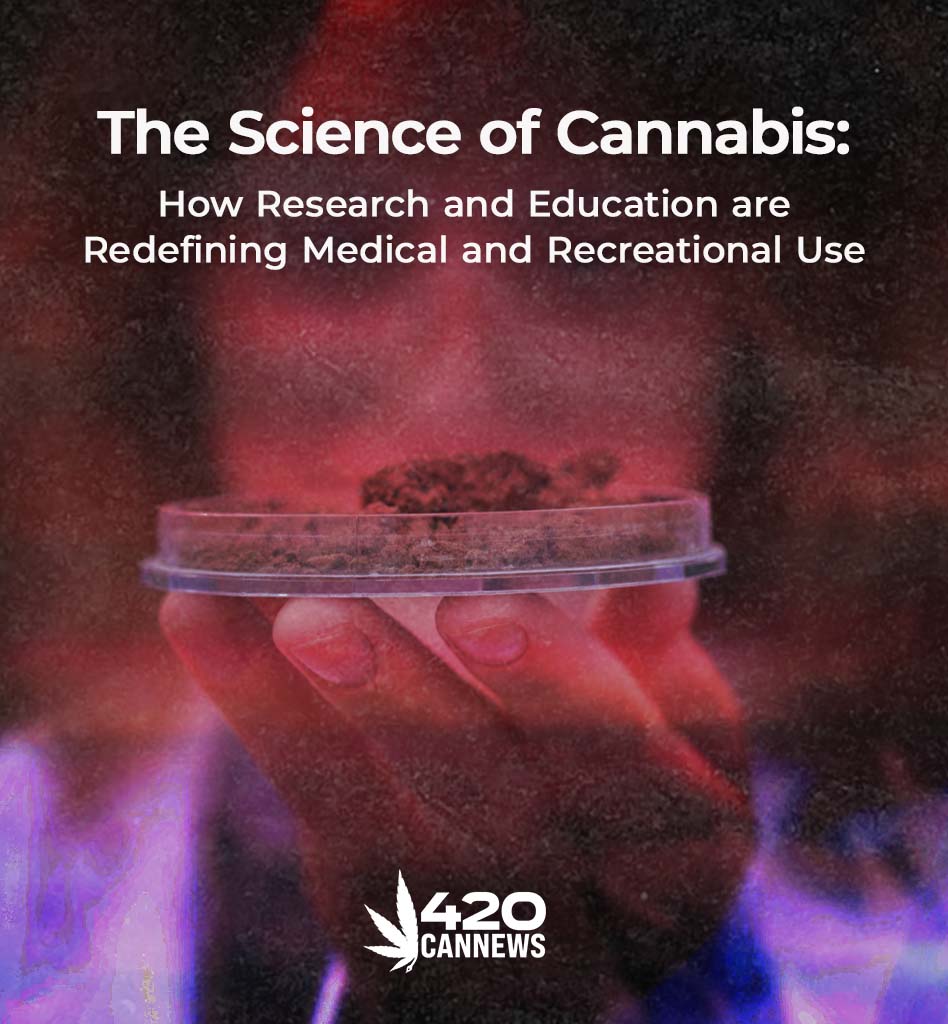Cannabis has long been subject to stigma, mainly due to misconceptions and a lack of facts about its benefits and risks. Today, however, a wave of scientific research and academic support is reshaping how society perceives both medical and recreational cannabis. With increasing studies highlighting its therapeutic potential and universities offering cannabis-focused programs, cannabis is gaining credibility in mainstream society, moving beyond its counterculture and gaining credibility. Here, we’ll examine how ongoing research, and academic programs dismantle stigmas and legitimize cannabis as a valuable resource.
Medical and Recreational Cannabis: Research Backed Benefits
Increasing Cannabis Research and Its Social Impact
Historically, restrictions on cannabis research have limited public understanding, but recent studies are changing that narrative. With more states legalizing cannabis, researchers are now examining cannabis’s properties, its benefits, and its potential risks with unprecedented depth. Research shows that marijuana strains alleviate mental health issues, reduce inflammation, and manages pain, fostering its acceptance in modern healthcare.
Research into cannabinoids (compounds found in cannabis) like THC and CBD has shown potential in treating conditions like epilepsy, chronic pain, PTSD, and even certain cancers. This information is now widely accessible, leading people to rethink what they thought they knew about cannabis.
Major Studies and Key Discoveries in Medical Cannabis
Some pivotal studies have gained attention for their role in validating medical cannabis:
- Pain Management: Cannabis has proven to be an effective alternative for pain relief, especially for patients with conditions that don’t respond well to traditional medications. Studies show that specific marijuana strains high in CBD can reduce inflammation and offer relief for conditions like arthritis and multiple sclerosis.
- Mental Health: Research has shown potential benefits of cannabis for mental health conditions such as anxiety, PTSD, and depression, with patients using controlled doses of cannabis for mood stabilization. This therapeutic use is now helping people view cannabis as part of the wellness space.
- Epilepsy Treatment: Perhaps one of the most influential studies on cannabis is its application in epilepsy, particularly in children with Dravet syndrome. The case of Charlotte Figi, a young girl who experienced reduced seizures with the help of a cannabis extract, helped inspire the medical cannabis movement, underscoring its life-changing potential.
A Balanced Perspective: The Risks of Cannabis
While studies support cannabis’s benefits, researchers also emphasize responsible use. Some research has identified potential risks, such as dependency, cognitive effects, and interactions with other medications. The academic push for transparency in these studies is key in fostering responsible usage among both medical and recreational users.
Educational Institutions Embracing Cannabis Studies
Cannabis Studies in Universities: Breaking Barriers
The academic world is embracing cannabis studies, lending credibility to the field and preparing future professionals. Universities across the U.S., including prominent institutions, now offer programs focused on various aspects of cannabis—biology, business, agriculture, and law. These programs help bridge knowledge gaps, equipping students with a comprehensive understanding of the cannabis ecosystem and dispelling the myth that cannabis use is strictly a recreational activity.
For example, the University of Maryland launched a Master’s program in Medical Cannabis Science and Therapeutics, emphasizing scientific study and health care applications. Courses in these programs cover topics such as cannabis cultivation, safety and quality assurance, the regulatory landscape, and how different marijuana strains affect the body. As a result, students are prepared to enter a field where they can make informed contributions to society, whether in medical research, regulatory roles, or as responsible retailers in the cannabis industry.
Key Areas of Focus in Academic Cannabis Programs
- Medical Research: Programs delve into the chemistry and pharmacology of cannabinoids, helping students understand how THC, CBD, and other compounds interact with the human body to deliver medicinal effects. Students learn to work alongside medical professionals and researchers to contribute to cannabis’s medical legitimacy.
- Business and Economics: Given the industry’s rapid growth, educational programs are also focusing on the business side, equipping students with the skills needed to manage or work in dispensaries, navigate cannabis regulations, and run supply chains for various cannabis store locations.
- Law and Policy: As the legal landscape around cannabis evolves, programs in law and policy address the complexities of regulatory compliance, consumer safety, and the ethical considerations involved in cannabis sales and marketing.
Pioneering Institutions and Their Influence
Some universities have taken the lead, offering cannabis-focused programs that help remove the lingering stigmas associated with cannabis. For instance, Northern Michigan University offers a degree in Medicinal Plant Chemistry, and UCLA provides cannabis law courses. These institutions are shaping a generation that views cannabis through an informed and balanced lens, whether for recreational use, medical application, or business.
The Social Impact: How Research and Education Change Perception
Redefining Cannabis in Healthcare
The increasing body of research and university-backed cannabis education are influencing perceptions within the medical field. Doctors, pharmacists, and mental health professionals now have the tools to consider cannabis as part of treatment plans and guide patients in responsible use. This changing view among healthcare providers promotes open dialogue between patients and physicians, further normalizing cannabis’s medical applications.
Generational Shifts in Cannabis Perception
Cannabis education and research appeal across generations, helping to dismantle misconceptions among older adults while providing younger generations with accurate knowledge. As people see universities treating cannabis as a legitimate subject, they are more likely to view it as an established part of healthcare and commerce. This acceptance is visible as people from different backgrounds, including students, patients, and medical professionals, increasingly support the cannabis industry.
Cannabis Research and Community Wellness
For communities, the rise of academic research and education on cannabis brings an emphasis on responsible consumption. For instance, people researching “marijuana dispensaries near me” or visiting a cannabis store now often seek information on specific strains that address health concerns or wellness goals, which reflects a shift from purely recreational interest to a health-centered approach. Educational resources from reputable institutions contribute to a well-rounded perspective, making cannabis a part of the wellness ecosystem.
Challenges and the Path Forward
While cannabis research and education have made remarkable strides, some challenges remain. Federal restrictions still limit research funding, and some universities hesitate to offer cannabis courses due to legal concerns. Advocacy for clearer cannabis policies, as well as increased funding for research, could empower more universities to include cannabis in their curriculum.
For the cannabis industry, partnerships with universities can be key in advancing research, promoting responsible use, and integrating cannabis into mainstream society. Dispensaries and retailers can benefit from this research by offering products that align with consumers’ wellness needs and preferences.
As scientific research continues to explore cannabis’s medical and therapeutic potential, and educational institutions embrace cannabis studies, the social narrative around medical and recreational cannabis is changing. The cannabis plant, long stigmatized, is emerging as a legitimate and beneficial substance with a broad spectrum of applications. Thanks to the combined efforts of researchers, healthcare providers, and universities, society is beginning to see cannabis as a valuable asset for both health and wellness, opening doors to a future where cannabis is understood objectively and responsibly.
Curious to learn more about the latest research on marijuana and how findings affect the narrative of the whole cannabis industry? Stay updated on cannabis research breakthroughs and education programs. Subscribe to 420cannews!As cannabis gains recognition in mainstream health and wellness, what potential benefits or challenges do you foresee in its expanded role within society?
Please note: While we aim to provide accurate and current information, this content is not intended to replace professional medical advice. For guidance on the medical use of cannabis, always consult a healthcare professional.
Here’s more information on the Topic:
Why Expanding Marijuana Research Matters
https://www.scientificamerican.com/article/why-expanding-marijuana-research-matters/
Americans overwhelmingly say marijuana should be legal for medical or recreational use
https://www.pewresearch.org/short-reads/2022/11/22/americans-overwhelmingly-say-marijuana-should-be-legal-for-medical-or-recreational-use/
Examining effects of medical cannabis narratives on beliefs, attitudes, and intentions related to recreational cannabis: A web-based randomized experiment
https://www.sciencedirect.com/science/article/abs/pii/S0376871618300206


